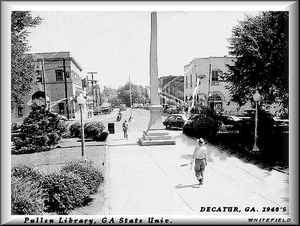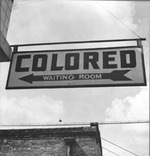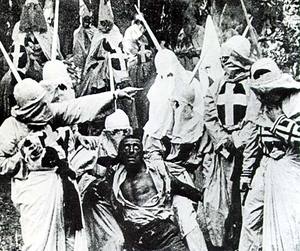Think of this as Volume 11, Number 34 of A-Clue.com, the online newsletter I’ve written since 1997. Enjoy.
The Crisis of 1860 restored the Union, but the Crisis of 1896 settled the question of race for three generations. (That’s the square in Decatur, Georgia, in the 1940s, dominated by the Confederate War Memorial which still stands.)
For black people, the cause was lost. Jim Crow’s reign was thoroughly established in the 1890s. All the gains black folks fought for during the Civil War were taken back. Their sons and daughters would live in virtual slavery, second class in the North, serfs here in the South. Separate but "equal."
Under Jim Crow young blacks were lynched routinely. Through the 1960s an innocent man could be grabbed off the street, tossed into jail, condemned in a show trial, and placed into chain gang slavery for years, ostensibly to pay the costs of his own jailing. Black schools were shacks, water fountains and bathrooms were separate.
The struggle to change this, the crisis of the 1960s, would nominally succeed, but it would turn the Democratic Party which fought that struggle into a minority party for another generation. Today’s rule is equal but separate.
One of my first friends after I moved to Atlanta was a soldier in that struggle.
In the summer of 1983 John Flint, my new next-door neighbor, invited me to his birthday party. It turned out to be his centennial. Born in 1883, the son of a slave, he was honored that October 1 as the lifeblood of Agnes Scott College, having run its dining hall and helped turn plain brick into something fancy and fine. Every living President of the college was there. One said he proved by the way he lived that some black men aren’t the equal of white men, that they’re better, and this knowledge transformed generations of southern girls, changed them, enlisted them in the struggle.
It was Mr. Flint’s daughter Edna House who encouraged our friendship. It was one of the great pleasures of my life. It introduced me and my family to my other neighbors because our "bargain" home placed us on the black side of the color line.
There are many ways to look at the generational rise-and-fall of history. The Crisis of 1860 made us one country. That of 1896 created an era of progressive change. That of 1932 brought an age of unity and liberalism. That of 1968 brought order back. (In Griffith’s The Birth of a Nation even the black lynching victims were played by whites. From PBS.)
Or you can look at the same events as I just did. The Crisis of 1860 made black people free. That of 1896 made them serfs. That of 1932 gave them a stage on which to fight. That of 1968 gave some entry to the middle class. The struggle goes on.
Today the South is as solid as it ever was, with the growing segregation endorsed by the government in Washington. Blacks run some cities and counties, blacks who conform can live in most of our better neighborhoods, blacks who are rich can build their own McMansions. But true integration is still a long way off. Black people still need institutions like Morehouse College, they still need their own churches, because without them most feel themselves to be in a foreign land. Even those with money. Segregation remains the way of life.
Will that change, with a government in Washington that doesn’t need the South, that can ignore its Republican governments, cut them off from the subsidies, the military contracts, and the highway funds that have created this new order of equal but separate?
I don’t know. But that’s another way to look at the future.
White folks made up their own history of The Lost Cause. You can see it in D.W. Griffith’s Birth of a Nation, or played for laughs in Buster Keaton’s The General. The Confederacy was the victim, the Klan a defense of rights, Jim Crow a necessity and the natural order.
After the 60
My point today is there are other Lost Causes. There were causes lost in the upheaval of the 1890s, which made Southern Democrats necessary players in national politics, at the expense of people like Mr. Flint. There were causes lost in the upheaval of the 1960s, too. The revolutions of Martin Luther King Jr. and Jimmy Carter went only so far, and they were, in large part, reversed after 1980. Whites flew to the suburbs, they went Republican, they became the majority, took power and they’re now strangling cities like Atlanta in favor of white suburbs like Powder Springs.
The slogan of Southern Republicanism remains separation now, separation tomorrow, separation forever.
Joe Biden knows. He was elected to the U.S. Senate at age 29, turning 30 just in time to take his seat. He has spent more than half his life there, fighting a rear-guard action against the Nixon Thesis. He was there during the Clarence Thomas hearings. He was there during the Clinton Impeachment. He was there during the First Gulf War, and the Second, always strident in opposition, always speaking truth to power, generally in the minority.
He knows what I’m talking about here. He knows just how many of the gains of the 1960s have been lost. He knows what that Lost Cause truly is.
And then there’s the man he serves, who frankly grew up with none of this. Barack Obama is Hawaiian, his mother a child of the 1950s, his father a Kenyan of noble lineage. The history of black America was something he had to choose to dive into, at Columbia, in Chicago, then at Harvard Law. He knows of the struggle, knows what has been lost, but it’s an academic knowledge. It comes from his head, not his heart, which is why so many southern blacks distrusted him until early this year. So many preferred the Clintons, who had fought and lost beside them. They understood how gains can be reversed. They knew idealism had its place, but it could not be the primary place.
As it is with our next President.
If Americans are allowed a free election (and that still can’t be guaranteed) Barack Obama will be our next President and Joe Biden our next Vice President. One is the veteran of a Lost Cause (but not the one you think). The other faces the Crisis of 2008, the War Against Oil and all of it, squarely and honestly.
Consensus is the theme. Build a consensus here in America and expand it as wide as you can. Build a new consensus in the World and use that to save the world. Take this medium, this Internet, and these tools, these computers, and place them squarely on the side of solving our terrifying problems, the worst mankind has ever faced.
The crisis starts in January. Edna House, Mr. Flint’s daughter, is now 95. No doubt she is proud today. But she is also realistic.
The Civil War is still being fought. And it can still be lost.














